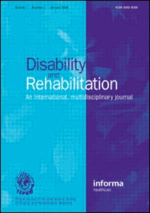
Trauma
Early multidisciplinary approach no more effective than usual care for traumatic injuries
This report has been verified
by one or more authors of the
original publication.
Disabil Rehabil. 2013 Jul;35(14):1149-63. doi: 10.3109/09638288.2012.721047. Epub 2012 Oct 22
142 patients who had suffered a traumatic injury within 4 weeks were randomized to receive treatment using either a multidisciplinary intervention (MI), or usual care (UC) to determine the effectiveness of this approach on physical and psychological functioning. Results at 6 months indicated that there was no significant difference in physical or psychological function between the MI and UC groups. However, when the patients at risk for post-traumatic stress disorder (PTSD) and depression were compared to the control group, those in the MI group reported better pain relief and a lower frequency of general physician (GP) visits. Acute post-traumatic adjustment, acute PTSD and depressive symptoms, acute pain and alcohol use were identified as the best predictors of psychological outcomes, mobility, and pain at 6 months.
Unlock the full article
Get unlimited access to OrthoEvidence with a free trial
Start TrialCritical appraisals of the latest, high-impact randomized controlled trials and systematic reviews in orthopaedics
Access to OrthoEvidence podcast content, including collaborations with the Journal of Bone and Joint Surgery, interviews with internationally recognized surgeons, and roundtable discussions on orthopaedic news and topics
Subscription to The Pulse, a twice-weekly evidence-based newsletter designed to help you make better clinical decisions
Exclusive access to original content articles, including in-house systematic reviews, and articles on health research methods and hot orthopaedic topics
Or continue reading this full article
Register Now

Subscribe to "The Pulse"
Evidence-Based Orthopaedics direct to your inbox.





































